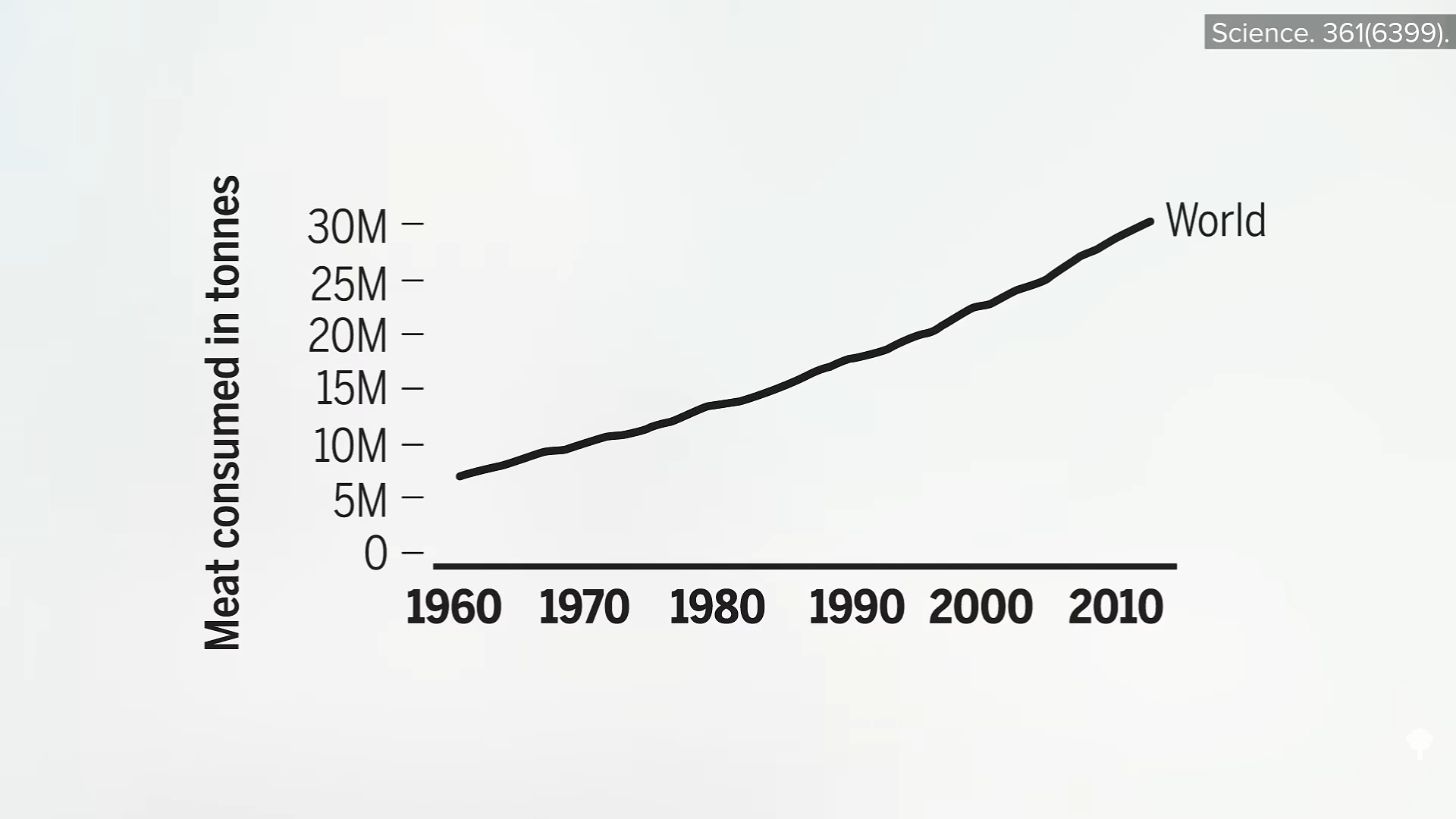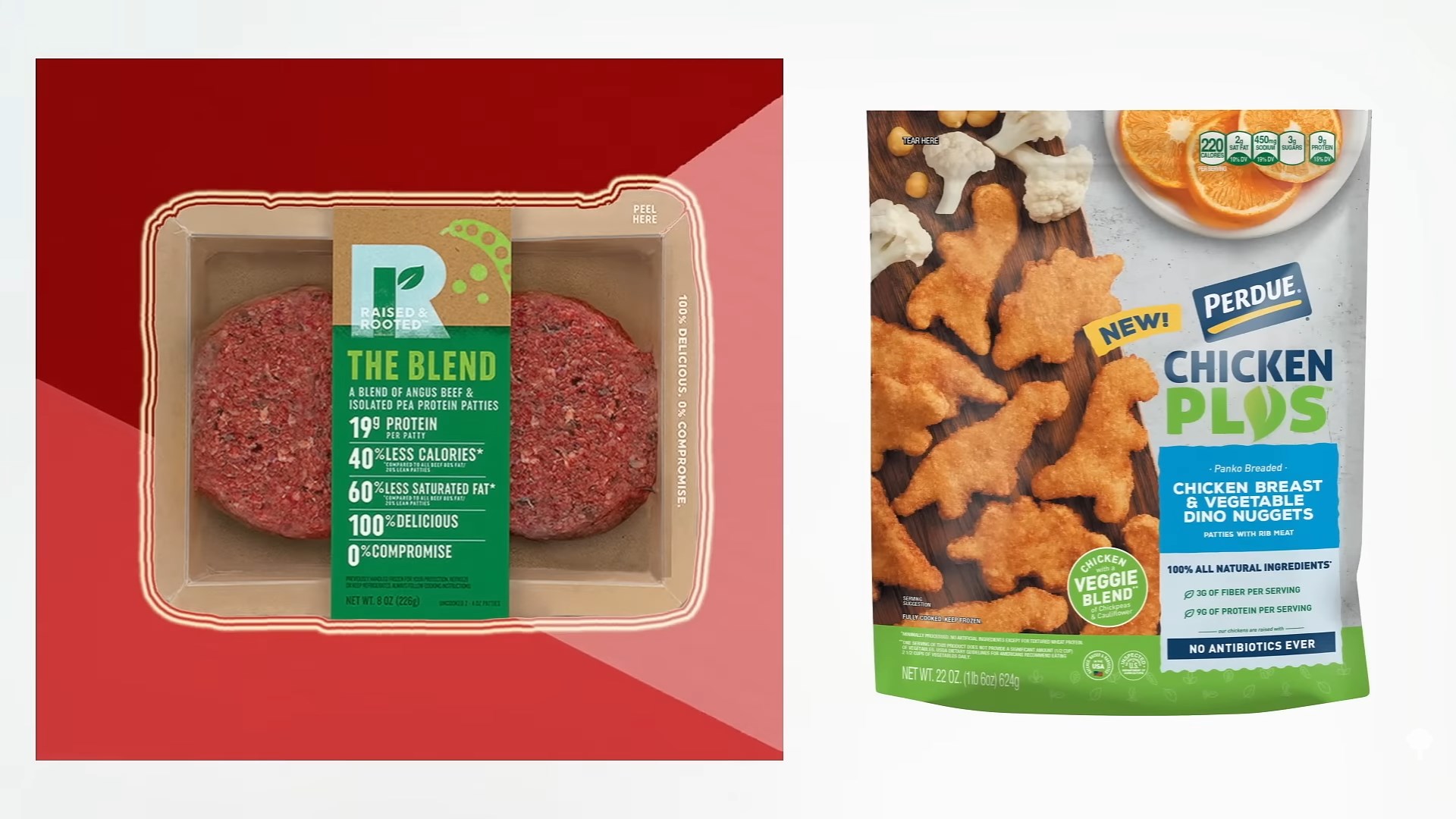Environmental assessments of fifty totally different plant-based meats present them to be vastly extra sustainable than animal-based meats.
“There’s rising consensus that transitioning in the direction of lowered meat consumption and extra plant-based diets is a key characteristic to deal with vital well being and sustainability challenges” that humanity is dealing with, but the graph beneath and at 0:25 in my video The Environmental Impacts of Plant-Based mostly Meat Substitutes exhibits that the trajectory of world meat consumption has elevated.

In line with the Meals and Agriculture Group of the United Nations, “we must double the manufacturing of meat and dairy to fulfill the anticipated demand for animal proteins in 2050.” Nevertheless, we must do the precise reverse to comprise the ecological injury and “environmental influence of livestock.”
“Practically each credible forecast exhibits that if we’re to have any likelihood of assembly future meals in a sustainable vogue, reducing our meat consumption can be completely important.”
Extra centralized governments could also be efficient in influencing consumption patterns. For instance, the “Chinese language authorities has outlined a plan to cut back its residents’ meat consumption by 50%,” however for the reason that predominant drivers of world meat consumption are components corresponding to rising incomes, urbanization, and Western tradition, the “predominant recognized drivers of meat demand are tough to affect by direct coverage intervention.” Thus, we should take our case on to the buyer. Nevertheless, data and schooling might not be sufficient. We might have the “elevated availability of ready-made plant-based merchandise.”
Too typically, alone, “ethics and sustainability doesn’t stand a lot of an opportunity in a world of customers…Many customers appear deaf to moral arguments…[that] are rapidly forgotten when one is shopping for meals.” When it comes to “customers’ perceived obstacles to following a plant-based weight-reduction plan,” the biggest barrier could merely be “meat appreciation,” having fun with the style of meat. So, in follow, if we wish individuals to shift to plant-based choices, “the style, construction and dietary worth of vegetarian meals could possibly be developed to extra intently observe the preferences of meat eaters.” Why design a veggie burger primarily for vegetarians? They’re already not consuming meat. When Patrick Brown based Unattainable Meals, “his objective was to create one thing a burger lover would say is healthier than any burger they’ve ever had.’” Additionally within the market is “the Past Burger, created by Past Meat, an organization based to deal with local weather change by creating vegan merchandise free from meat and animal by-products” which might be “Juicy, Meaty and Scrumptious.”
However are they higher for the local weather? In that case, how a lot better? Respected teams have printed environmental lifecycle assessments overlaying the Unattainable Burger and the Past Burger, and I did a brief piece for the Swiss funding agency UBS summarizing the outcomes, as you’ll be able to see beneath and at 2:48 in my video.

Certainly, switching to both plant-based meat choice, the Unattainable Burger and the Past Burger scale back greenhouse gasoline emissions, land use, and water footprints by about 90 %, in comparison with beef.
Comparable lifecycle analyses have been carried out on greater than 50 totally different plant-based meats. All such research discovered them to be vastly extra sustainable than meat and processed meat merchandise, with no actual variations in greenhouse gasoline (GHG) emissions noticed between the totally different sources of protein used within the plant-based meats, whether or not wheat, soy, or one other. Although, clearly, any merchandise containing eggs could be considerably worse with “considerably increased quantities of GHG.”
Now, after all, if we went straight to the unprocessed peas and soybeans from which the Past and Unattainable Burgers are made, we wouldn’t get only a 90 % decrease environmental influence, however round a 99 % decrease influence. That influence drops to zero, nevertheless, if nobody is keen to eat it.
A evaluate of shopper analysis on meat alternate options discovered that though concerns like “well being, environmental and animal welfare facets can persuade customers and affect their choice to strive a meat substitute, the looks, and style of these meat substitutes are essential components for his or her consumption frequently.”
Apparently, today, plant-based meals could even have a leg up. Researchers gave omnivorous faculty college students each animal- and plant-based chocolate milk, macaroni and cheese, rooster tenders, and meatballs, however informed them they have been really all created from vegetation. The researchers “surprisingly and unexpectedly discovered that when topics tasted the meals and rated how a lot they appreciated the style, those that have been informed the meals was vegan appreciated the meals significantly higher than did those that have been informed the meals was of animal origin. Thus, considering a meals was vegan really elevated liking for the style of that meals.”
Different demographics could have a distinct response, although, wherein case there is all the time “sustainability-by-stealth,” utilizing blended merchandise that substitute a number of the animal protein for plant protein. Not too long ago, such “hybrid merchandise (meat analogs wherein a part of the meat is changed by plant-based elements) have made a promising entrance,” a lot in order that Perdue and Tyson, two main meat producers, are bragging in regards to the incorporation of plant protein into their blended merchandise, as you’ll be able to see right here and at 4:41 in my video.

That is from the primary of 9 movies in a sequence on plant-based meats, which incorporates the titles within the associated posts beneath.
For background on meals and local weather change, see Weight loss program and Local weather Change: Cooking Up a Storm.









Discussion about this post